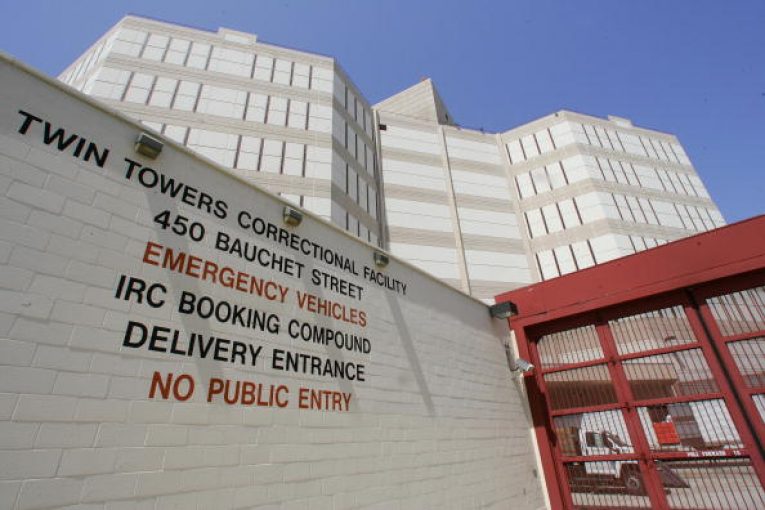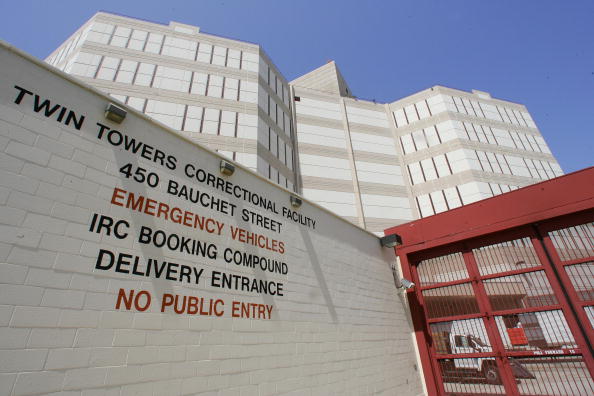

By Tammerlin Drummond
Markese Braxton, 26. Rene Snider, 39. Stanley Wilson, Jr., 40. They all had severe mental illness and were deemed incompetent to stand trial for crimes that they had allegedly committed during a mental health crisis. But instead of getting court-ordered treatment, they were sent to jail to wait for a bed to become available at a state psychiatric hospital. Then they unexpectedly died, leaving their families devastated and in search of answers.
“To this day we’ve had no accountability,” said the Rev. John Braxton, Jr., the father of Markese Braxton who died June 6, 2018, in the Twin Towers Jail in Los Angeles. “What’s happening is just evil.”
In April, the ACLU of Northern California sued the California Department of State Hospitals (DSH) for refusing to provide public records about the circumstances of the deaths of individuals like Markese Braxton, Rene Snider, and Stanley Wilson, Jr., who were on the DSH wait list. State officials claimed that doing so would violate the privacy of the deceased.
“The Department of State Hospitals is trying to hide behind privacy laws to insulate itself from public scrutiny,” said Emi MacLean, a senior staff attorney with the criminal justice program at the ACLU of Northern California. “The fact that people with severe mental illness are dying in such numbers in California jails due to a lack of prompt treatment and a safe setting is unconscionable.
“This latest lawsuit is a continuation of our ongoing legal and advocacy work to stop the prolonged detention of people in county jails who have been declared mentally incompetent to stand trial. In 2015, we sued DSH and the Department of Developmental Services, in Stiavetti v. Ahlin. The courts ordered the state to reduce lengthy delays that forced individuals with mental illness to languish in jail for months, while  waiting for a transfer to a treatment facility. And for the last several years, we have fought to ensure state officials’ compliance with the court order.
waiting for a transfer to a treatment facility. And for the last several years, we have fought to ensure state officials’ compliance with the court order.
“DSH is responsible for providing mental health treatment to defendants deemed mentally incompetent to stand trial so they can eventually return to court to participate in the criminal proceedings against them. The agency reported to the ACLU in response to a request for information that at least 35 people on the wait list passed away between January 2018 and September 2023.
“Our ACLU investigators combed through public records, news articles, and other sources to identify as many of those people as possible.
“We’re highlighting testimonials from three families as part of our continuing campaign to advocate for changes to an inhumane system that fails to protect some of the most vulnerable among us. They have all filed wrongful death lawsuits relating to the death of their loved ones.”
Markese Braxton
The Rev. John Braxton, Jr., and his wife Kathy visited their son Markese at Twin Towers Jail. He was in a good mood because he thought he was about to finally be transferred to a state hospital for treatment.
Three days later, on June 6, 2018, a sheriff’s deputy arrived at their Riverside home and told them Markese had died.
The coroner’s report labeled the cause of death “undetermined.” It noted that Markese had soft tissue damage on his hands, back, shoulder and shins. A second autopsy cited blood between his brain and skull.
Markese’s parents struggled to understand what could have happened in the few days since they had last visited him. Five years later, Rev. Braxton said it is painful to look at pictures of his son.
Growing up, Markese loved basketball. He was on his school honor roll. Then he began hearing voices. He was diagnosed with severe bipolar disorder and schizophrenia and placed on medication.
The Braxtons tried to get help for their son. But because he was an adult, there was little they could do. The Braxtons took Markese food. They did his laundry and paid his bills. Then one day in September 2016, he disappeared. He’d been arrested, accused of carjacking a bus and robbing a Carl’s Jr. It was the first time he had ever been in trouble.
Markese was deemed mentally incompetent to stand trial and transferred to Patton, a state psychiatric hospital. After just one week, doctors deemed him competent to stand trial. His parents pleaded with the hospital to keep him. They told authorities that their son was not ready to go back to court to stand trial. But they sent him back to jail anyway.
He was again found incompetent to stand trial and recommitted to DSH on March 21, 2017. But he was never transferred back to a state hospital. Instead, on June 6, 2018, he was found slumped on the floor of his cell, unresponsive.
“What happened?” asked the Rev. John Braxton. “A 26-year-old man with no history of physical health problems, heart problems, liver problems just ended up dying in a one-man cell with his knuckles busted up?”
Rene Snider
The last time Lyza Martinez saw her mother Rene Snider alive, she was screaming that she loved her from a jail cell. It was October 2016. Lyza was 11. Her sister Drea was 12.
Rene was devoted to her young daughters. Even as she began to experience paranoia and delusions brought on by borderline personality disorder, Rene held down a job as a medical transcriber. She provided a comfortable home and took the girls on family outings.
Rene sought help from psychiatrists who prescribed various medications. But her condition continued to deteriorate. She feared someone had planted microphones at her home in Merced. She sometimes read Bible verses to the wall. Her mental illness eventually cost her joint custody. Her daughters went to live with their father and his wife. Rene became convinced—falsely—that her daughters’ father was molesting them. She became fixated on the need to protect her daughters.
In October 2016, Rene picked up her daughters in a rental car. She drove them to Canada where she planned to seek asylum. They were detained at the border. Lyza and Drea were returned to their father in California. Back in Merced, authorities charged Rene with kidnapping. Her bail was set at $1 million. She posted bail. But she was banned from having any contact with her daughters.
For nearly 2 ½ years, she complied with her bail terms. But according to her mother Denise Sawyer, Rene’s mental health grew worse. Rene’s attorney scheduled her for a mental competency evaluation. A court psychiatrist said she was a flight risk and posed a danger to her children. On March 18th, 2019, Rene was arrested and booked into Merced County Jail. Her mother said that once there Rene was abruptly taken off her psychiatric medications.
After five days in jail, Rene hanged herself with a bedsheet from a twin bunk bed.
“My mom broke the law because of her mental illness. She should have been taken to a hospital and never should have been in jail,” Lyza said. “We’ve gone through hell and a lot of guilt since she died.”
Stanley Wilson, Jr.
It has been more than a year since D. Pulane Lucas received the worst news a mother could get. Her only son, Stanley Wilson, Jr., had died suddenly. Her grief has been made all the more painful by the fact she and her family have been fighting since Stanley’s death on Feb. 1, 2023, to get answers to basic questions about what happened to him. For the last five months of his life, Stanley was incarcerated at Twin Towers Jail.
Stanley had once been a student leader and star athlete in track and football at Stanford. He later went on to play in the NFL for the Detroit Lions, until an Achilles injury ended his career. A long history of untreated trauma stemming from childhood sexual abuse and mental illness had derailed his once promising life.
After football, Stanley struggled with substance abuse and severe mental illness. He started trespassing into people’s homes in the nude, symptoms of psychotic episodes. In August 2022, he was arrested for trespassing after breaking into a house in the Hollywood Hills and bathing in an outdoor fountain. Stanley was found mentally incompetent to stand trial. But he died before he ever got the mental health treatment that he was legally entitled to.
Lucas said the Los Angeles County Medical Examiner’s Office first told her that Stanley had collapsed in his cell and died. Then, she was told that he passed away while in an ambulance on the way to the hospital. Later, the medical examiner’s storyline—that was buttressed by the Los Angeles County Sheriff’s Department (LASD)—was that Stanley had fallen out of a chair and died during the hospital intake process.
The Los Angeles County Sheriff’s Department and the state Department of Hospitals each insist that Stanley was in the other’s custody when he died. As a result, his name does not appear in county or state correctional health care databases that track in-custody deaths.
Lucas said her son had ligature marks on his wrists and head wounds that suggest he was a victim of intensive restraint or excessive force. LASD has refused her numerous requests to view the correction facility’s video footage of the last 45 minutes of Stanley’s life.
After his death, Stanley was diagnosed with chronic traumatic encephalopathy or CTE, a progressive neuro-degenerative disease that affects people who have suffered repeated concussions and has been linked to football players.
Lucas has become a tireless advocate, demanding accurate reporting of in-custody deaths. She feels Stanley’s spirit as she travels the country testifying before state legislatures and helping organize vigils to remember those who died. She is committed to working with grassroots organizations to push for improved prison and jail conditions.
“Our loved ones deserve to be protected in life and counted in death,” Lucas said. “Because their lives mattered too.”
